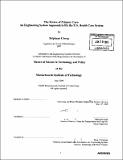The future of primary care : an engineering system approach to fix the U.S. health care system
Author(s)
Chong, Stéphane
DownloadFull printable version (18.75Mb)
Alternative title
Engineering system approach to fix the U.S. health care system
Other Contributors
Massachusetts Institute of Technology. Technology and Policy Program.
Advisor
Mahender Singh.
Terms of use
Metadata
Show full item recordAbstract
The ailing U.S. health care system faces two tremendous challenges: a rising health care bill and a growing number of uninsured individuals. Several policies have been enacted to tackle these challenges but they are short-term patchwork solutions rather than long-term holistic solutions needed to address structural issues. Despite the market-based aspect of the U.S. healthcare system, self-correction of structural inefficiencies is unlikely to happen. A new care model has to disrupt the current care system. In line with this observation, we propose to analyze the potential of a new primary care delivery as a solution to address the two key challenges threatening to destabilize the U.S. health care. Based on our analysis of the literature, we note that chronic diseases account for a large proportion of the health care bill. Yet, the delivery model to provide chronic care, where primary care plays a central role, is inefficient, fragmented and insufficient. Compounding these ailments, primary care is facing its own crisis resulting from the shortage of generalist doctors and the inflating demand for primary care services. As primary care is critical for the continuity and coordination of medical care, resolving the urgent situation facing this branch of practice should be a top priority to improve quality of care while reducing health care costs. Every stakeholder in the current health care system should collectively contribute to the primary care model redesign endeavor. (cont.) To this end, we apply an engineering system approach to devise an appropriate course of actions for health care businesses, health care providers and policy-makers in redesigning primary care. We discuss insights gained through a collaborative project with a local hospital to model and simulate a new primary care practice. These insights were geared to guide decision-makers in the design of care processes, resources allocation and appointment rules. In conclusion, we show that primary care has a critical role to play in the much-needed revolution of the U.S. health care system. It will require active collaboration of health care providers, business leaders and policy-makers to enable this disruptive change.
Description
Thesis (S.M. in Technology and Policy)--Massachusetts Institute of Technology, Engineering Systems Division, Technology and Policy Program, 2009. Includes bibliographical references (p. 75-78).
Date issued
2009Department
Massachusetts Institute of Technology. Engineering Systems Division; Technology and Policy ProgramPublisher
Massachusetts Institute of Technology
Keywords
Engineering Systems Division., Technology and Policy Program.